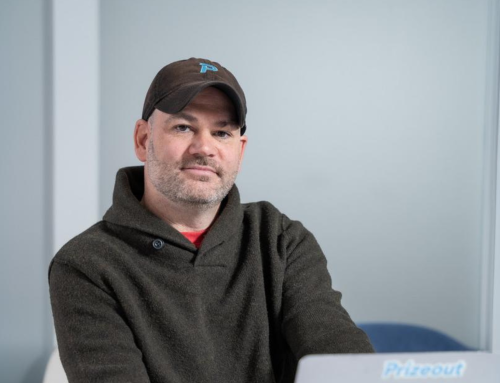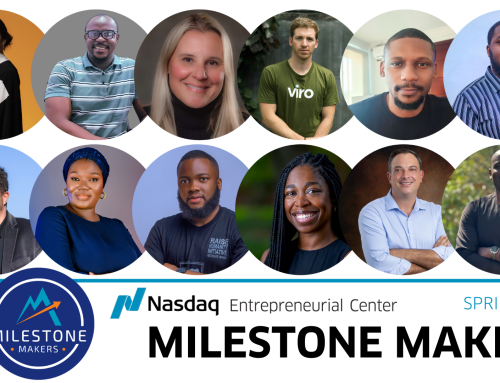Nanea Reeves is the CEO & co-founder of Tripp, a virtual reality startup that’s focused on creating mood-altering virtual reality experiences for consumers to live more happily and effectively. Reeves took a moment to update the Nasdaq Entrepreneurial Center on her journey as a founder so far.
What does “entrepreneurship” mean to you?
NR: You own the outcomes of your decisions, good or bad. This is a mindset that can apply to any work environment. Some people just show up and others own their initiative to drive them to completion.
How did your company come to be? (describe the a-ha moment that lead to its conception)
NR: I’ve always had a love for video games, and I wanted to create something that could help a lot of people. The idea for TRIPP dates back to the early days of Oculus when the headset was still in development. My co-founder Zach Norman and I first created a virtual reality Solitaire game that took place in a haunted house, which sparked major interest in the VR development for TRIPP.
When we were testing out our VR game, we started to notice that we felt like we were being taken away from our lives in a very positive way — it was refreshing. That got us looking at the effects of VR on the brain.
Then, one night I had friends over and watched them get “high” on VR and that was when I came up with the idea that mood-altering VR could work.
 What is the biggest experience or lesson gained on your journey so far?
What is the biggest experience or lesson gained on your journey so far?
NR: I’ve learned that getting the right investor, who believes in your vision as much as you do, is key to the development of an early stage company. I can say from experience that new entrepreneurs are often excited about someone writing that first check but oftentimes don’t realize that accepting that money from someone just for the fact that you need funding doesn’t always turn out favorably. I believe that an investor really needs to be thought of as a core team member who has a huge say in the direction of the company. It is the one key hire that you cannot “fire.” This comes with great responsibility as I’ve learned that you need to be careful about who you’re inviting into your business as you would with any team member.
How is your company changing the landscape?
NR: TRIPP is creating transformative digital experiences — a toolkit for personal transformation. It’s a way to change the way you feel without using substances.
We use guided meditation in a unique way, and the beginning of the journey gets you into a state of receptivity. Then the environment starts to transform in a way that’s calculated to stimulate the response or feeling that you’ve selected. We’re not trying to replicate anything that exists in the real world — it’s about using VR as a native application to do something that can only be done in VR. We are into stimulation rather than simulation.
Is there anything you wish you knew when you started? Is there anything you would do differently?
NR: In my career overall, I wish I’d understood earlier on how important it is to not take things personally. I wasted a lot of time trying to prove myself to others. Things really started happening for me when I started focusing on proving things to myself. That being said, my work life really started to advance when I started to look at things more like playing a video game. In a video game, you learn to win by losing over and over. You build a muscle for incremental learning through the process of dying, respawning, and staying alive just a little longer the next round. And like any game well played, you can even respect the moves of your opponents and strategize how to beat them at their own game. Showing up to work every day with this type of mindset works very well for me. I find it incredibly motivating to play the game for fun, and, of course, to win.
As far as doing things differently, there are two times in my career where I knew I was right about a strategic initiative that had quite a bit of opposition and resistance and I did not fight hard enough to get the buy-in I needed to get it done. In both instances, I was right and the trajectory of the company was impacted by not doing those initiatives. I look back at those two moments and vow that I will never let myself feel that way again. Some ideas are worth fighting for no matter how much pushback you get.
What’s your professional and personal mission statement?
NR: Play the game; don’t let the game play you.
What advice do you have for fellow entrepreneurs about building and leading teams?
NR: As a serial entrepreneur, I have identified key team members I like to work with throughout my career. I treat those people like gold. I repeat hire those people over and over because it mitigates risk and saves time.
When working with startup teams, having employees with the right talent and attitude is so important. Fifteen years ago, I met a woman who really impressed me, but I didn’t have the resources to hire her until a year and a half later. Since then she’s worked for me three times.
My partner Zack and I have worked together previously at three other companies. We have very complementary viewpoints that make a greater whole. You definitely don’t want people who are in agreement with you all of the time. I want team members who are going to speak up and tell me when I am about to hit an iceberg.
Where do you find inspiration when faced with challenges?
NR: Sometimes problems will just show up, but I find that bringing my attention to the present moment and taking a deep breath allows me to get in touch with that “observing mind” I can achieve through meditation. It is an incredibly valuable toolkit to have as a business leader.
The benefit of being mature is that I know from past experiences most things will work out as long as you are willing to be honest with yourself. Data really helps to provide clarity as to whether something is worth ongoing investment, should be adjusted or even abandoned. You can’t argue with high-quality data.
I think collaboration is important, too. I love the process of getting smart people in a room to look at a new challenging idea or concept and figure out how to make it happen. There is nothing more exciting to me in the world than this. It is why I love what I do.
What does “success” look like for you? What do you think will help you achieve it?
NR: For TRIPP, success would be people using our product every day because it helps them live a better life. Having that sense of purpose and an end goal is more inspiring to me than anything else I have ever done in my life.
What is your proudest and darkest moment so far?
NR: A lot of people view work and life as separate, but they aren’t. You can’t spend 8-10 hours a day with people and not have some kind of impact on each other. When my late husband was dying from an illness, I could barely show up for work but my work community really showed up for me. At the most challenging time of my life, it was also such a mind-blowing and powerful experience for me to see how many of my current and former colleagues rallied around me with tremendous support. It gave me a deep understanding of how we become connected as we work side by side on a daily basis toward building something together.
Navigating loss while still having to show up for my work definitely changed me and since that time I have put a greater focus on what it means to be a compassionate leader. I still have to know how to make hard calls, but even this can be done with a focus on the greater good and not make my work only about my own journey. It becomes about contribution even if it is just about providing a great place to work for people. It is my belief that this will only have a positive impact on the products we are making.
What lesson did last year have for you? What do you look forward to the rest of this year?
NR: Last year was a big one for female founders. It was a year when more female entrepreneurs were well received by Silicon Valley venture firms than ever before. People are looking closely at company culture and how it needs to change and while this may be a difficult transition for some, I believe overall the effects will be positive. Ultimately, it should come down to the fact that when you have a good idea and a proven track record you can get things done. As a leader, my primary focus in 2017 was to make sure our idea got funded. I am so grateful to Tim Chang and the team at Mayfield for believing in TRIPP’s mission. We couldn’t have found a better investor for kicking off our journey.
In 2018, I look forward to working with Zack and our team in realizing the vision of TRIPP in our launch product.
NR: Many entrepreneurs continue to perfect their daily routines to support their work and greater vision; would you mind sharing your morning routine or a regular ritual that grounds your work each day?
The first thing I do when I wake up is set my intention for the day. I usually meditate for 20-30 minutes in the morning, then I work out, get ready and take my dog for her morning walk. In the car on my way to work, I usually listen to a podcast or audiobook to get my brain focused on something other than the LA traffic.
What kind of an entrepreneur do you want to be known as, as in, what do you want your legacy to be?
NR: I want to be known as the person who got things done and more importantly, brought others along with her. I want TRIPP to be the career-defining company for our team members knowing that they were part of the team that created something that was both groundbreaking and beneficial to others. Nothing would make me happier than to do my part in making this happen for everyone involved in our journey.




Invite a Friend
Close